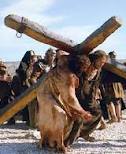 |
| Sometimes we think we are helping others when it is we who are being helped! |
CHAPTER 16 Howe Dew Wee Bare width te Faultz ov Udders?
Those things which a man cannot improve in himself or in others, he ought to bear patiently, until God commands otherwise. Perhaps it is better for your personal trials and growth in patience, without which our merits are worth little . You must nevertheless, under such obstacles, pray to God that He would grant you assistance, so that you can bear these with grace.
2. If one who is once or twice admonished refuses to listen, do not contend with him, but commit that person to God, that His will may be done and His honour be shown in His servants, for He knows how to convert the evil into good (Gn 45:5-8).
Strive to be patient in bearing with other's faults and infirmities whatever these are, for you yourself have many faults which others must bear. If you cannot make yourself what you desire, how will you be able to shape your fellow travellers to your liking. We are always ready to see others made perfect, and yet we do not amend our own shortcomings.
3. We would have others be strictly corrected, but we will not be corrected ourselves. The freedom of others displeases us, but we are dissatisfied that our own wishes are denied. We desire rules to be made restraining others, but by will not permit ourselves to be restrained. It is therefore evident how seldom we weigh our neighbour in the same balance as ourselves. If all were perfect, what then should we have to suffer from others for God's sake?
4. But now God has ordained things, so that we may learn to bear one another's burdens (Gal 6:2), because no one is without defect, none without a burden, none self-sufficient, none wise enough; but we must support one another, to comfort one another, to help, instruct, admonish one another. How much strength each man has is best proved by adversity: for such occasions do not make you frail, but rather show your strength.
This last paragraph says it all, doesn't it? Please forgive me my mistakes, brothers and sisters, and especially, my Lord. This Sunday God speaks to us through Isaiah in this Sunday's first reading, telling us how He aches at our transgressions "You burdened me with your sins, and wearied me with your crimes(Is 43:24).
Then God tells us His nature: "It is I, I, who wipe out, for my own sake, your offenses;
your sins I remember no more (Is 43:25).
Until next time, when we look again at living with one another, keep praying with me and reading along.
tim




No comments:
Post a Comment